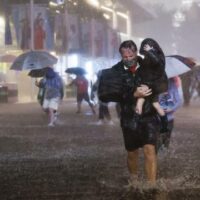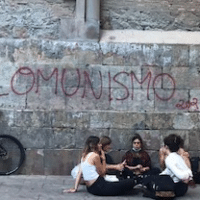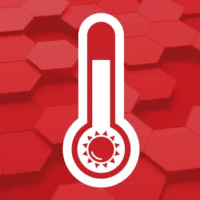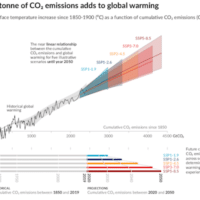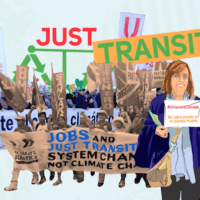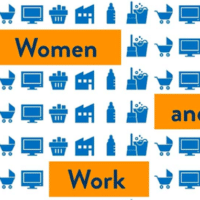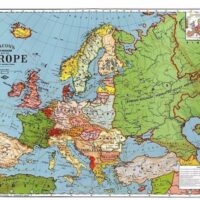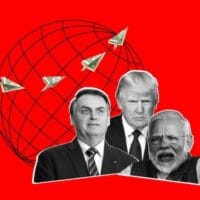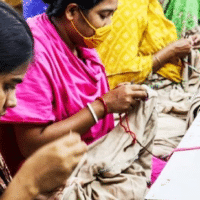-
The Northern Hemisphere’s summer of climate carnage
There is no doubt among scientists that the increasing frequency of extreme weather and associated disasters like fires is a result of climate change.
-
Where are the threads dropped with the criminal investigation of the Sackler family?’
CounterSpin interview with Rick Claypool on OxyContin immunity.
-
Monthly Review School and “The Present as History”: An Introduction
The conception of the present as history crystallized into an important principle of the intellectual tradition of Monthly Review magazine. Viewing the present as history entails combining what is new with a grasp of the longer process that is vital to a deeper understanding of the present. This Introduction provides an initiation to the intellectual tradition of Monthly Review, from which we have selected the essays and the interview that appear in The Present as History 2021.
-
The IMF’s announcement of $650 billion in Special Drawing Rights: advertising effect
The 190 countries that are members of the IMF are entitled to allowances in strong currencies which they do not have to pay back. This device is called Special Drawing Rights. To this we must add loans that the IMF can grant to a country calling for help. Loans must be repaid with interest and are tied to conditions that reinforce neoliberal policies.
-
Solely because of the increasing disorder: The Thirty-Sixth Newsletter (2021)
A few days ago, I spoke to a senior official at the World Health Organisation (WHO). I asked her if she knew how many people lived their lives on our planet without shoes.
-
Law, code and exploitation
By the end of April 2020, the coronavirus epidemic outbreak was reaching millions. Thousands were dying daily. Nearly one third of the worldwide population was experiencing different degrees of forced quarantine.
-
Capitalism vs. the Planet
The latest IPCC report paints a picture of five potential futures for humanity. In the worst one, if corporations keep calling the shots, we could see catastrophic warming of up to 5.7˚C.
-
We are scientists, calling for a climate revolution
Academics are perfectly placed to wage a rebellion: we exist in rich hubs of knowledge and expertise; we are well connected across the world, and to decision-makers; we have large platforms from which to inform, educate and rally others all over the world; and we have implicit authority and legitimacy, which is the basis of political power. We can make a difference.
-
200+ medical journals demand emergency climate action
Editors urge ‘fundamental changes to how our societies and economies are organized’.
-
End vaccine apartheid
Vaccine costs have pushed many developing countries to the end of the COVID-19 vaccination queue, with most low-income ones not even lining up. Worse, less vaccinated poor nations cannot afford fiscal efforts to provide relief or stimulate recovery, let alone achieve Agenda 2030.
-
Part 2: Just transition beyond the industry shutdown scenario
Industry expansion relates to sectors such as public transport, where decarbonisation requires more buses and trains and fewer private car journeys. Industry evolution relates to new sectors, such as solar and offshore wind farms, that are newly emerging and do not have any history of labour relations, but there will not be space to discuss this fourth scenario in this column.
-
Part 1: Defend and transform–mobilising workers in all sectors for climate justice
Mobilizing the global labour movement for climate justice and just transition is one of the defining challenges of our times. However, for workers in many sectors, it is unclear how climate issues will affect them specifically, and how they should respond.
-
The Pasts and Futures of Social Reproduction as Dual Terrains Struggle
This article discusses Susan Ferguson’s Women and Work and how it advances contemporary debates about social reproduction within and beyond Marxist feminism. In particular, I emphasise its call for avoiding hierarchising struggles against oppression and those against exploitation, and for centring a dual-terrains approach. – Maud Perrier
-
Advance Release! The Leaked IPCC Reports
It is a sign of just how serious matters have become—with the UN COP26 talks on climate in Glasgow this November now regarded by many as a last-ditch effort to achieve a global solution on behalf of humanity as a whole—that the early draft versions of Part II and Part III of the IPCC’s, ‘Climate Change 2021: The Physical Science Basis’, were leaked during the summer.
-
Neo-Liberalism and Nationhood
There is a tendency in the West, including even among progressives, to treat all “nationalism” as a homogeneous and reactionary category. They treat even anti-colonial nationalism as if it is no different from European bourgeois nationalism, notwithstanding the several crucial differences between the two.
-
Bolivarianism & Marxism: Commitment to the Impossible in Defense of Utopia
Socialist revolution throughout the world, looking to the horizon of the communist utopia, will have to collide with worldwide capitalism for that phenomenon to be overcome definitively. Socialist revolution surely will be breaking the imperialists’ chain at its weakest link, as Lenin would have said.
-
Black Box East: The role of “the East” in the West’s radical imagination
The potential of the BLACK BOX EAST as a common space of transnational struggles is a matter of ongoing inquiry. Contributing to this cooperative process, social thinker Max Haiven and historian Vijay Prashad discuss about the role of “the East” in the Western radical imagination. An interview.
-
Why neoliberalism needs neofascists
It has been four decades since neoliberal globalization began to reshape the world order. During this time, its agenda has decimated labor rights, imposed rigid limits on fiscal deficits, given massive tax breaks and bailouts to big capital, sacrificed local production for multinational supply chains, and privatized public sector assets at throwaway prices.
-
Multinational Corporations and COVID-19: Intellectual property rights vs. human rights
The multilateral trading system anchored by the WTO is not confined to cross-border trade in physical goods.
-
How Amilcar Cabral shaped Paulo Freire’s pedagogy
Frantz Fanon’s influence on Paulo Freire’s thought is well known, but the Brazilian educator also drew considerably from Amílcar Cabral, the revolutionary intellectual from Guinea-Bissau.

